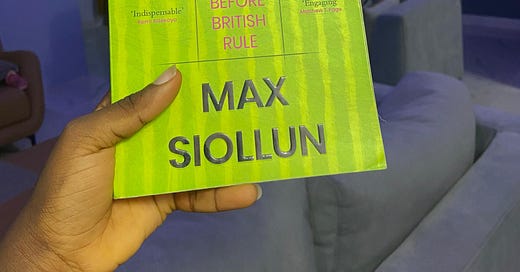Book Review: The Forgotten Era by Max Siollun
“The job of a historian is to make the past intelligible to the present”. Michael Cook
The historian Michael Cook once wrote that, “The job of a historian is to make the past intelligible to the present.” That is exactly what Max Siollun has been doing with his books. First, it was Oil, Politics and Violence. Then he gave us Soldiers of Fortune and Nigeria’s Soldiers of Fortune. After that came What Britain Did To Nigeria. His latest work is The Forgotten Era.
The Forgotten Era seeks to help us understand the people who lived in the different territories that eventually became Nigeria. As usual, this book reads like a thriller. You can’t stop once you begin. It opens with Nok, then takes you through the Hausalands, Oduduwa’s children, and the people who refused to have kings—the Igbos. It doesn’t stop there. It also covers the Nupes, the Benin people, and many other characters and individuals who are largely forgotten today.
One of the most novel things I enjoyed while reading this book was how Max Siollun was able to place events in Nigeria within the context of global history. Did you consciously know that the Usman Dan Fodio Jihad happened around the same time as the American and French Revolutions?
Max Siollun calls Usman Dan Fodio’s family “The First Family of Northern Nigeria.” That cracked me up. Who would have thought Nigerian history could be made so fun? It even sounds like something out of American political commentary. This book gave me my first thorough understanding of Usman Dan Fodio. I learned that he was not just a fighter—he was a scholar and an erudite man. His education and influence were so vast that his footprints are everywhere in Northern Nigeria. It’s hard to study that region’s history without passing through him. Interestingly, because of this legacy, Northern Nigeria has more recorded precolonial history than any other part of the country.
(Ironic, isn’t it? Given the current widespread perception—and reality—of Northern Nigeria as educationally backward. Unsurprisingly, this is the product of government policy, one that began under British colonial rule and was sustained by successive Northern Nigerian state governments.)
I first learned of Mohammed Kanemi through this book. I also learned something particularly fascinating about Borno: it was never conquered by Usman Dan Fodio’s jihad.
The Oyo Empire was quite something else. The elaborate system of separation of powers was remarkable. It tells you something about how wise our ancestors were. Long before the American founding fathers established a system of checks and balances, the Oyos already had theirs in place.
You also get to meet various kings from Benin, Nupe, and other regions. And then, there are fascinating individuals like Bishop Samuel Ajayi Crowther—the former slave boy captured from his home village and almost shipped off to the West Indies, until British anti-slavery forces stopped his ship, rescued him, and sent him to Sierra Leone. From there, he became a bishop and returned home with an education, training, and a mandate that made him the most consequential African Christian of the 19th century.
If Ajayi Crowther had been born in another country, there would be monuments of him everywhere.
Another figure who fascinated me was Olaudah Equiano. What a man! Taken as a slave from present-day Igbo territory, he endured years of slavery in the West, but was so intelligent and driven that he eventually gained his freedom. He became a formidable anti-slavery advocate. His name, when translated to modern Igbo, means “to speak.” And speak he did—for his people!
You’ll also meet Madam Tinubu, the woman who survived kings and coups. Max does a great job of including women who made a real impact on Nigeria’s precolonial history. It’s not just a history of men. There are brave, brilliant, and ambitious women too.
This book is packed with so much information that you might need to read it twice just to absorb everything. Your consolation is that it’s such a good read, you won’t notice the pages flying by.
Max goes to great lengths to ensure he presents all alternative views of the origin stories of different peoples. I respect him for that. One of the hardest parts of his task is the absence of written records—and you can feel the difficulty in his words.
So, what’s the point of all this history?
It’s to understand Nigeria.
It’s to form a narrative that helps us understand ourselves.
It’s to form a narrative that helps us relate to each other.
By the time you reach the end, you’ll encounter some of Max’s powerful conclusions.
How we remember history is important.
Take one critical event: the 1966 coup. For many years—and even till now—there are those who still call it an Igbo coup. That idea fueled the counter-coup, the pogroms, and eventually the Civil War. And to this day, many have not forgiven the Igbos for that so-called original sin.
But here’s the thing: Former Head of State, Ibrahim Babangida, in his recently released book, explicitly stated that the 1966 coup was not an Igbo coup. He knew that. Yet, back then, that false narrative was the fuel that ignited the violence.
Max Siollun already wrote this in his 2007 book. He said it before Babangida did. So, Max is not just writing—he’s helping us remember rightly.
One day, Nigerians will fully understand themselves. One day, we will form a collective narrative about who we are. And when that day comes, Max Siollun will be standing at the top of that hill, celebrating us—because he’s been pointing us there all along.
Read this book if you are curious about Nigeria before colonial rule.
You can get it on Roving Heights here: https://rhbooks.com.ng/product/the-forgotten-era-pre-order/




